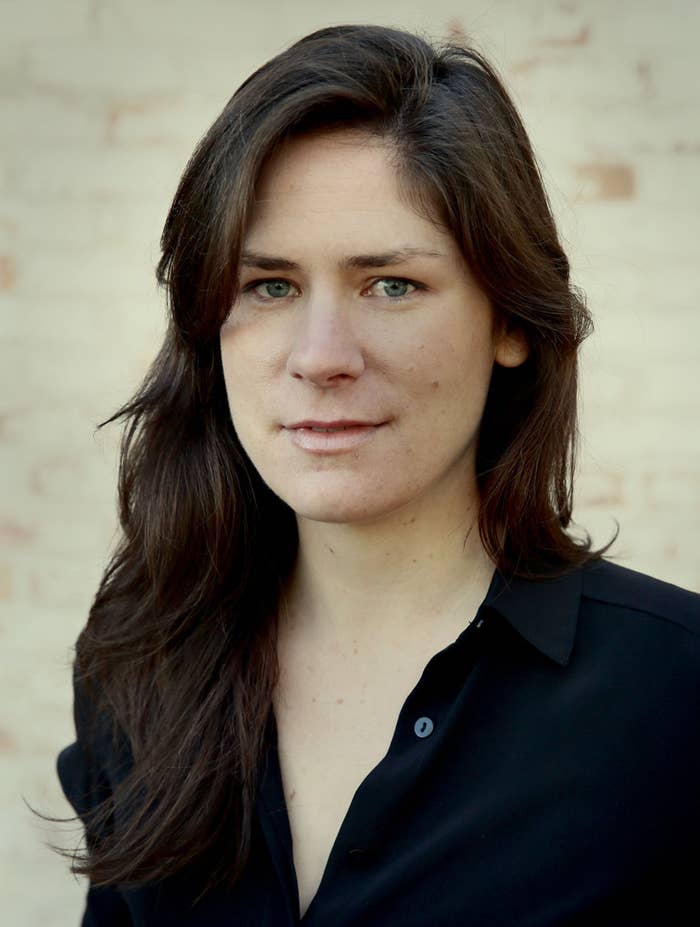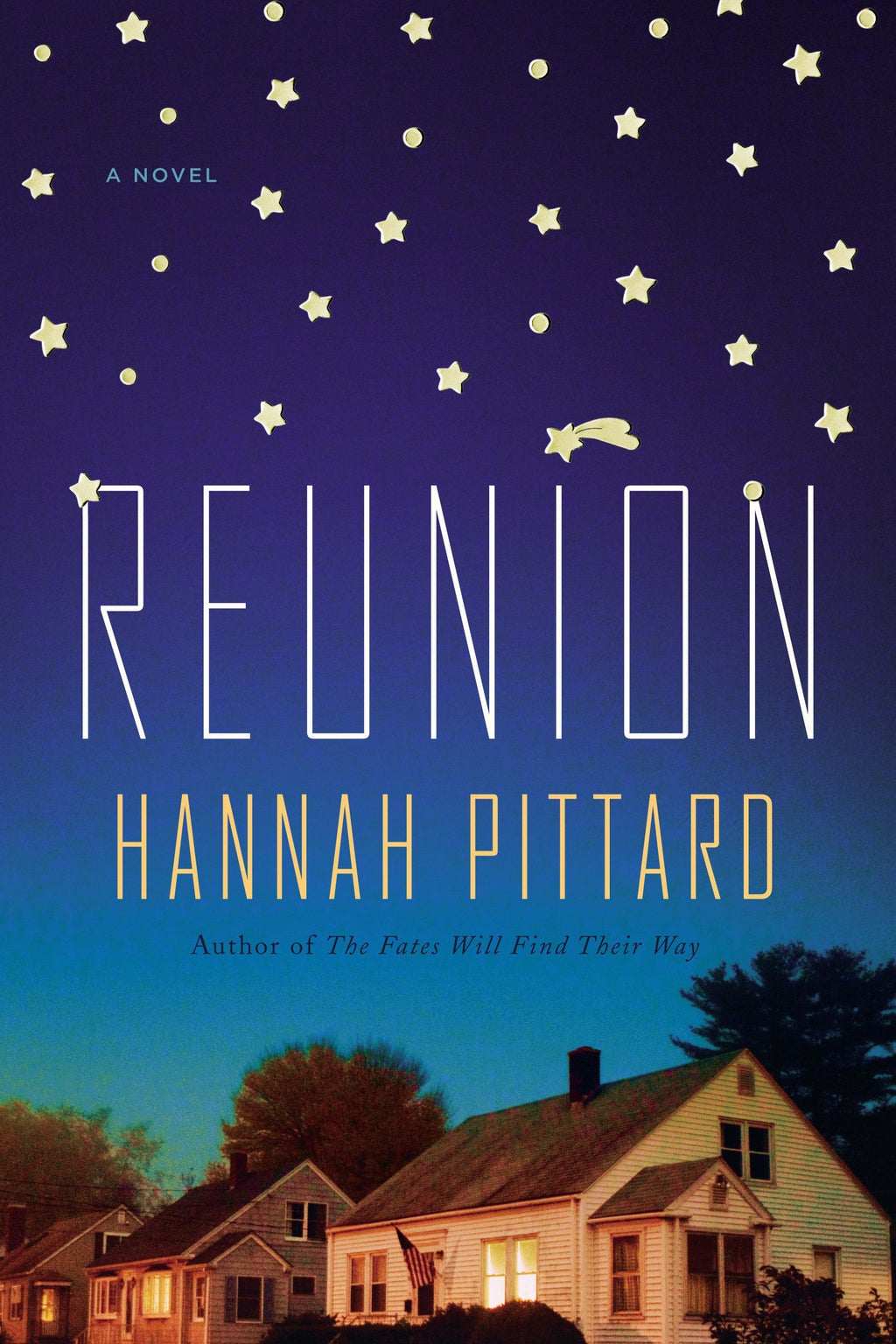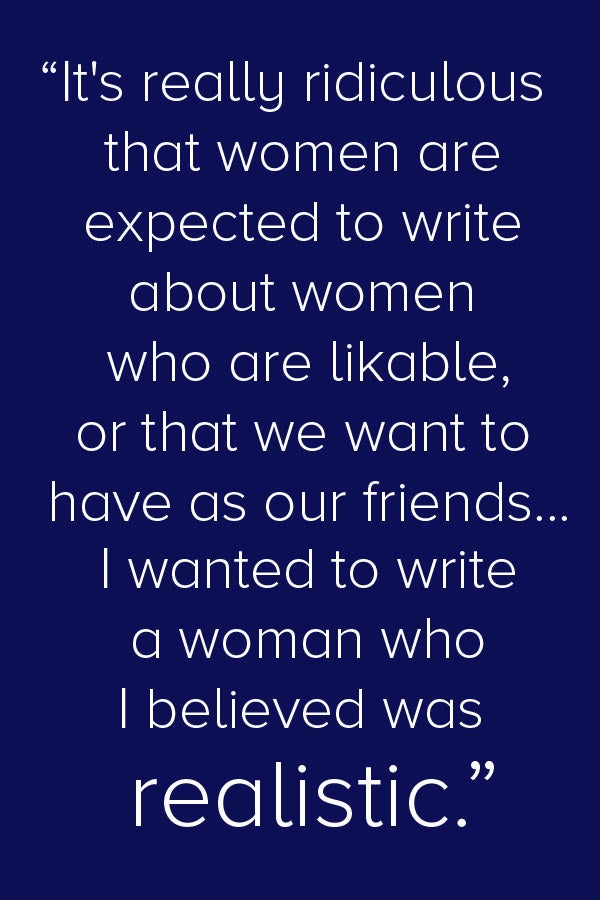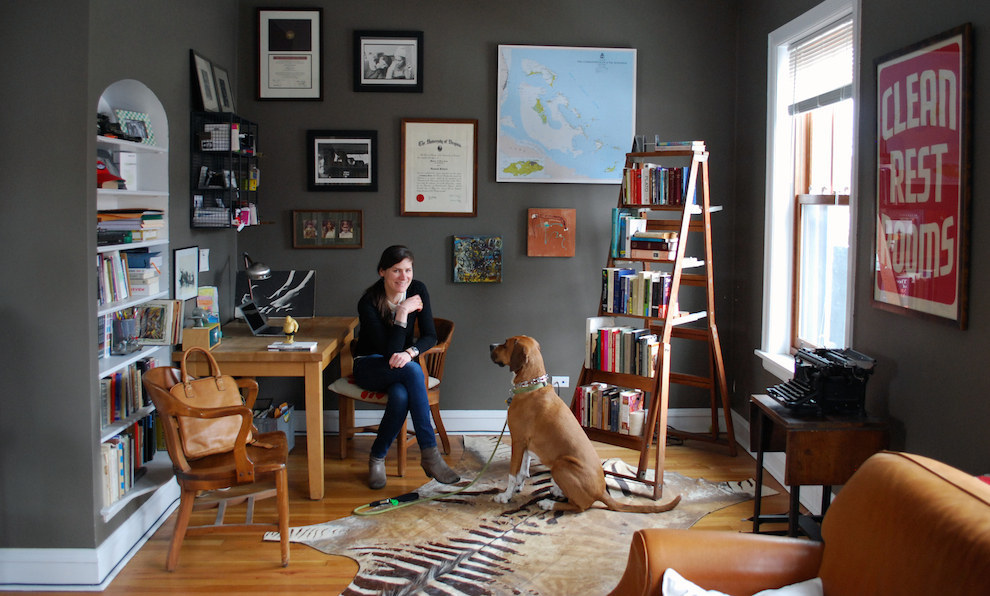
Long before we get to the point at which Hannah Pittard makes a joke about her flailing arms, I've already scribbled on my notepad: talks with her hands. The author is animated in a way you wouldn't think possible over a Google Hangout interview, and she acknowledges this, like she acknowledges most things over the course of our conversation, with charming self-deprecation.
"If you were here with me, you'd see that my arms would be all over the room," she says. "I would've hit you a few times accidentally by now. I like to think that I'm a very tiny person, but I'm very long."
We arrive at this moment because she's comparing herself to her dog — a boxer/blue tick hound mix named Elmer T. Lee, after the bourbon — and his tendency to both underestimate his size and misunderstand his surroundings, bumping into trees and knocking over signs. But Hannah's motion is less clumsiness and more excitement, and the effect is both disarming and comfortable: not unlike her writing.
Pittard's debut novel, The Fates Will Find Their Way (Ecco, 2011), caused a ruckus before it was even published; three agents vied to represent it, and 10 editors entered a bidding war to claim it. The book, which uses a collective narrative voice to tell the story of a 16-year-old suburban girl who goes missing and the boys that miss her, met critical praise at its launch. The Washington Post called it "chilling and touching" and Pittard herself "harrowingly wise about the melancholy process of growing up"; the New York Times referred to her "grace[ful] prose" and its emergent "exquisite details that translate instantly into memory." It has haunted me since I read it three years ago, to such an extent that I snatched (and devoured) an advance copy of her second novel, Reunion (Grand Central), the second I saw her name attached to it.
Her books are the sort that leave you reading the blurbs, scanning the small print, and prolonging the reading experience as long as possible. She's the kind of writer who gets in your head and makes you evangelize to all of your friends — wide eyes, quick gasp: "Do you know about Hannah Pittard?" If she's not on your radar yet, she should be. Here's what you need to know.
1. She lays it all out in Reunion.
Reunion opens with professor and failed screenwriter Kate Pulaski on a plane, finding out that her estranged father has killed himself. It then follows her and her adult siblings over the course of four days, during which they return to Atlanta, confront their understanding of their father, their relationships with each other, and their respective failings in their separate lives. Kate — self-destructive, self-centered, quick-witted, complex — is not Pittard, though Pittard unapologetically admits their similarities. ("I often tried to imagine myself, and then have her make an even more terrible decision than I might have made, or make the decision that I might have made five years ago. It was fun to do. It was cathartic.")
Even the tragic circumstances of the novel are based in reality. Pittard's family does come from Atlanta, and it was a suicide (her grandfather's, a man with whom she had a "difficult relationship") that brought her and her two older siblings back there. "This is my most autobiographical novel," she says. "I think that it will be the closest that I ever come to writing about me."
2. She nails the nuances of family dynamics — especially in close siblings who are navigating separate, adult lives.
The sibling bond — that complicated and often inexplicable love that Pittard so expertly encapsulates in Reunion — comes directly from Pittard's relationship with her own two siblings, both older. Kate goes back and forth between feeling understood and alienated among her older, more successful brother and sister, and manages dueling desires to both prove herself as an adult but also be taken care of. It's a disconnect that will ring true for anyone who has navigated the changing relationships within families into adulthood.
"We start looking so much at ourselves and we assume that these people who are in our lives, and who know us better than anybody," Pittard says, "we assume that we still know them in the way that we did when we were children. And, of course, we all grow up, we move out of that same house, and we have our own lives. It's so easy to forget that their own lives, or those other lives, have their own problems."
3. The most autobiographical aspect of Reunion almost didn't make it in.
One of Kate's most shameful secrets (and there are a few) is that she is at the tail end of a long process of paying off $48,000 in credit card debt — a sum she racked up on "clothes and shoes and booze and food." It's the motivating factor of her relationship with her husband, and the source of an unspoken power imbalance among the siblings, but the debt — which, to the dollar, matches Pittard's (now fully repaid) debt — was missing from the first draft.
"I sent [the first draft] to a couple different friends, and one of them said, 'It's as though there's a secret that you're keeping. There's something that this book is about and you're not telling me, and I don't know what it is.' And the way she said it, it was immediate, I knew: It was money. It was like it was this hidden thing that I wasn't admitting, or allowing my character to have, and once I realized that I wanted her to, and I was willing to give her that aspect of me, it was so liberating, and the book sort of took off."


4. She's obsessed with breaking silences and writing about the things no one likes to talk about.
Kate's massive debt is just one example, but it's an especially apt one. Rarely is it presented as matter-of-factly — both the debt, and the unglamorous work of getting out of it — as it is in Reunion, despite its being so commonplace that it should be mundane.
"There's this shame about credit card debt that I think we all have," Pittard says. "We don't want to talk about it in the way that we don't want to talk about money, and I feel now that I'm out of it, it's all I want to talk about. It's such a relief, you know?"
This impulse to bring the hushed topics to light is why she's able to write so honestly about things like suicide ("It was heavy on the brain, it needed to get out of me, and I had fun while I was writing it, which might sound heartless, but it was a pleasure to write because it had to get written"), mental illness, sexuality, and — in her next book — the discrimination (and silencing of that discrimination) that she witnessed growing up in Atlanta.
5. She's proud to follow in the tradition of the Southern writers who came before her.
Pittard attributes her love of literature entirely to Southern writers — specifically, Flannery O'Connor, William Faulkner, and Harry Crews — and describes reading them, as a child in the South, as "a feeling of this cloistered insider-ness to the goopy mystery of the South," intrinsically tied to its "despicable and violent history." It's largely their influence that has drawn her to putting all of these unspoken issues on the page.
"It was so necessary to surviving that place, and it was as though I had somebody to have a conversation with — I didn't know necessarily what to talk about, or why we were talking about it, but they were saying, 'Pay attention to this, look at this.' Harry Crews gave me sex in a way that I had never considered that it could be talked about, much less written about, much less considered literature. It was dangerous, exciting."
6. She's currently a creative writing professor at the University of Kentucky, but she owes it to years spent waiting tables.
When Pittard got the call that The Fates had sold, she was living rent-free with her future husband in her mother's farm on the outskirts of Charlottesville, waiting tables seven days a week, and funneling all of her money into debt repayment, electricity, and food. When asked how she would be celebrating the news, she remembers responding, "Well, when I'm off the phone with you, I'm going to go starch a white shirt, and then I'm going to put on an apron, and I'm going to work and be there until midnight. So, then, sleep?"
Her food-industry background is something she holds dear, though, and when a student on her first day of teaching asked her how she got where she did, Pittard very honestly responded, "Waiting tables." She remembers it fondly.
"I loved waiting tables, and I love what I do," she says. "I am lucky enough that even though it's been five years since I've waited tables, I have not forgotten it. Maybe in five more years I'll have forgotten and I'll have become this really privileged writer/professor, but I feel like I'm still very in touch with the 20-year-old, the 29-year-old, the person who couldn't sleep because of that debt. I don't imagine losing touch with those other iterations of me anytime soon, and that's nice because it allows me to really enjoy what I do. And I do."

7. She was reluctant to sign up for Twitter, but now she has the best bio in the history of Twitter bios.
After The Fates came out, Pittard was hesitant to play the social media game (she files this under "Lesson Learned" going from first to second book: "I could've done so much more to help with the publicity team that was kind enough to take me on, but I sort of had this attitude that 'Oh, the book will sell itself, the book will sell itself, you know, Hemingway, his writing sold itself,' which is so crazy to even put myself in that category!"), but she's since warmed up to Twitter. Her bio, from an Amazon review for The Fates, reads, "In fact, she writes a little too well, and that is what bothered me some about this novel," and is the dream example of a criticism that functions as an advertisement. So what does she think of the place?
"I find it incredibly welcoming. I use it mostly to promote other people's writing, to share articles that I've read that I think should be read, and to share pictures of my dog."
8. She's not interested in being told what to write or how to write.
The Amazon review that gave Pittard her Twitter bio is absurd, but it also captures a sentiment in criticism that seems unique to women writers: the idea that their talents should be focused on specific stories, and that it's even worthwhile to talk about what women should or shouldn't be writing about. Pittard's only ever taken pushback as motivation to power through it.
When some readers responded to one of her unpublished stories by saying that she couldn't convincingly write from a male perspective ("Their criticism was, 'I don't believe this because this man takes a bath'"), she went on to write an entire novel from the collective male point of view, negotiating her own discomfort with the male gaze. When readers asked her why there was no "happy" sex in The Fates, or why her characters were "unlikable," her response has been simple: "That's not what I'm writing about."
9. And she's not looking to create "likable" women.
In one of Pittard's MFA workshops, a friend who was discussing a story that would eventually be published in the Mississippi Review announced, "I just don't like any of these women, and now that I'm thinking of it, I don't think I've liked any of the women Hannah writes about." She remembers leaving "half devastated and half determined to prove him wrong" but it's a mind-boggling criticism that follows her still.
"It's really ridiculous that women are expected to write about women who are likable, or that we want to have as our friends," she says. "[In Kate] I wanted to write a woman who I believed was realistic, because I think women are so fascinating, and we are so complex, and we have a capacity for cruelty unlike, perhaps, men that I have known. And that, to me, you don't often get to — you aren't often invited to spend time with that part of a woman's brain. I certainly don't always love to talk about it in myself, but I am intrigued by it, and I think about it all the time."
Kate will make you cringe, for sure, but it's often the case that you're cringing because you're identifying with her, or at the very least, understanding her. And in a surprising and unusual way, the experience is cathartic.
"From the women I've talked to, everyone has said something along the lines of: Even if they don't like Kate, they get her, and that there's an aspect of femaleness that they haven't seen captures on the page before. And that pleases me. That makes me think, regardless of the reception of this novel, that I'm proud of it. If there's something that smart female readers identify with, fantastic. I've done my job."
10. Her writing will make you laugh and cry in public.
You have been warned.
